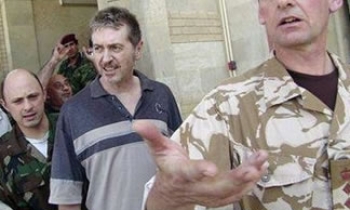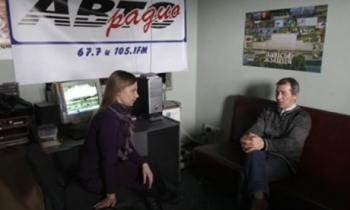Friday prayers in the Muslim world helped fuel further outrage against the caricatures of the Prophet Mohammed published in Europe, at the same time that the controversy promised to continue as more and more European publications were re-printing the cartoons.
As the controversy widened, what began to crystallize Friday was a clash-of-civilizations collision between Western views of freedom of speech and Muslim sensitivities on religion, particularly Islam's own strict ban whatsoever against drawing the Prophet Mohammed.
Angry demonstrations continued in several Muslim countries Friday, while the country where the controversy originated, Denmark, was anxiously awaiting the reaction to Prime Minister Anders Fogh Rasmussen's message on al-Arabiya television Thursday evening saying his country had 'no intention to offend Muslims.'
It was the Copenhagen paper Jyllands-Posten which originally published the 12 caricatures of Mohammed last September 30. It drew scant attention at the time, but then the cartoons were re-published in the neighbouring Nordic country Norway in late January, triggering the avalanche of indignation in the Islamic world.
'I have a very important message for you: the Danish people have defended freedom of expression and religious freedom for generations,' Rasmussen said on al-Aribaya. 'We deeply respect all religions including Islam and it is important for me to tell you that the Danish people have no intention to offend Muslims.'
But Rasmussen defended his country's tradition of freedom, saying, 'We have a free press and this freedom of expression is a vital and indispensable part of our democracy and this is the reason why I cannot control what is published in the media.'
By initial indications, his remarks on al-Arabiya did little to assuage Muslims' anger, with angry condemnations of the cartoons and demonstrations in, among other countries, Iran, Indonesia, Pakistan, South Africa, Russia, Germany, and the Palestinian areas.
In Iran, following the Friday prayer ceremony in Tehran, hundreds of thousands of worshippers staged a protest demonstration against the insulting cartoons, shouting 'Death to America,' 'Death to Israel' and 'This insult will not remain unanswered.'
In Pakistan, President Pervez Musharraf joined in the condemnation. 'These cartoons have inflamed our sentiments and I condemn them in the strongest terms,' he told local TV.
In the Palestinian areas, an estimated 20,000 persons emerged from the Friday prayers to demonstrate at the Palestinian Legislative Council building in Gaza City in observing a 'day of rage.'
At the same time, Palestinian President Mahmoud Abbas, while also expressing condemnation, urged militant groups not to harm European nationals and institutions.
'While we condemn these offensive cartoons of our prophet published in Danish and other European newspapers, we distinguish between what was published ... and European citizens who bear no responsibility for what was published,' Abbas declared.
A similar appeal for non-violence came from Germany's Muslims. Nadeem Elyas, who chairs the German Council of Muslims, one of three national groups representing Germany's mainly Sunni Muslim community, called the caricatures 'provocative' but appealed for protests to remain non-violent.
In remarks to the German daily Die Welt - which had reprinted the cartoons on Thursday - Elyas called the cartoons an attack on the prophet's dignity.
'It is legitimate to protest against the cartoons as long as this remains non-violent.' He said Muslims would be just as upset if Jesus Christ were to be shown in cartoons in such fashion.
At the same time that protests continued among the Muslims, further fuel to the controversy came as more European papers began publishing the cartoons in arguing the case of freedom of speech.
In Germany, besides Die Welt, two other papers - Die Zeit and the Berlin daily Berliner Tageszeitung - had published the cartoons as of Friday.
In Italy, two of the country's leading dailies joined in. In the best-selling papers, Corriere della Sera of Milan and Rome-based La Repubblica, the sketches were also accompanied by front-page editorials defending freedom of speech.
In France, the leftist-liberal Paris paper Liberation published the cartoons under the headline 'The Satanic Illustrations,' becoming the second French paper after France Soir earlier in the week.
Liberation's headline was a play on the title of Indian-British novellist Salman Rushdie's book, 'The Satanic Verses,' which were condemned by Muslim leaders as a blasphemy against Islam. The paper said the issue now was one of freedom of the press and speech.
But British Foreign Secretary Jack Straw strongly warned that freedom of speech was not a license to insult peoples' religions.
'There is freedom of speech, we all respect that,' Straw said. 'But there is not any obligation to insult or to be gratuitously inflammatory. I believe that the republication of these cartoons has been unnecessary, it has been insensitive, it has been disrespectful and it has been wrong.'
Straw went on to comment that 'There are taboos in every religion. It is not the case that there is open season in respect of all aspects of Christian rites and rituals in the name of free speech.
'Nor is it the case that there is open season in respect of rights and rituals of the Jewish religion, the Hindu religion, the Sikh religion. It should not be the case in respect of the Islamic religion either,' he said.









